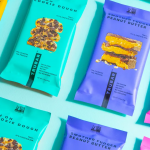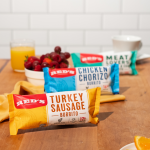Inside Fancypants Baking Co.’s Plans to Scale Its New Cookie Line
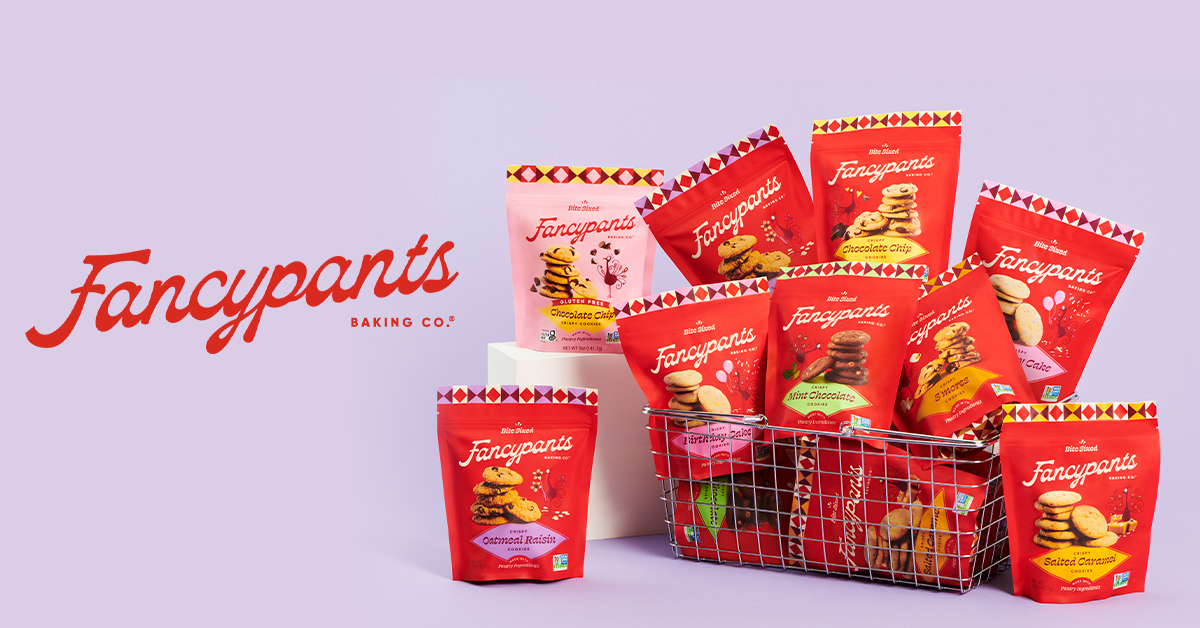
After two decades of focusing on decorated cookies, Fancypants Baking Co. is ushering in a new era of growth centered around a line of bite-sized, sustainability-focused cookies crafted with “pantry ingredients.”
In January, Fancypants debuted its 6-SKU line of crispy cookies in Birthday Cake, Chocolate Chip, Mint Chocolate, Oatmeal Raisin, S’mores and Salted Caramel flavors. The brand has since added a core Gluten-Free Chocolate Chip SKU as well as a seasonal, limited-edition Pumpkin Chocolate Chip flavor. The cookies sell for $34.99 per 6-pack of 5 oz. bags on the brand’s website and for $4.99 to $5.99 per bag at 1,750 retail stores nationwide, including Central Market, Gelson’s and Mother’s Market, among others.
“It wasn’t any one moment [that sparked the inspiration for the new line]. We thought about something that could have mass appeal, and when I grew up, that was delicious homemade cookies. It really felt right,” said founder and CEO Maura Duggan.
Founded in 2004, the Walpole, Mass.-based business began as a decorated cookie company selling to grocery accounts like Whole Foods and Roche Bros. Duggan made the cookies by hand – using ingredients that were “actually in [her] refrigerator” and pantry, like Cabot butter and King Arthur flour – in her Boston apartment, baking, decorating, packaging, delivering and invoicing the products by herself.
After reaching maximum capacity in her licensed residential kitchen approximately one-and-a-half years after starting Fancypants, Duggan moved production into a 1,000 sq. ft. commercial kitchen located in an old mill building in Walpole. In 2013, the company relocated to a larger, 20,000 sq. ft. facility, also located in Walpole, where it currently takes up 40% capacity.
Though Fancypants dabbled in a handful of subcategories over the years with products like Keto Cookies and Upcycled Oatmilk Cookies, the vast majority (roughly 79%) of its business came from its flagship decorated cookies. To diversify its revenue streams, the company also began co-manufacturing private label products for national retailers – which it still does today.
“At that point, I thought that Fancypants had the ability to be a national name, but I didn’t think it could be with the decorated cookie product. It became an evolving conversation,” said Duggan.
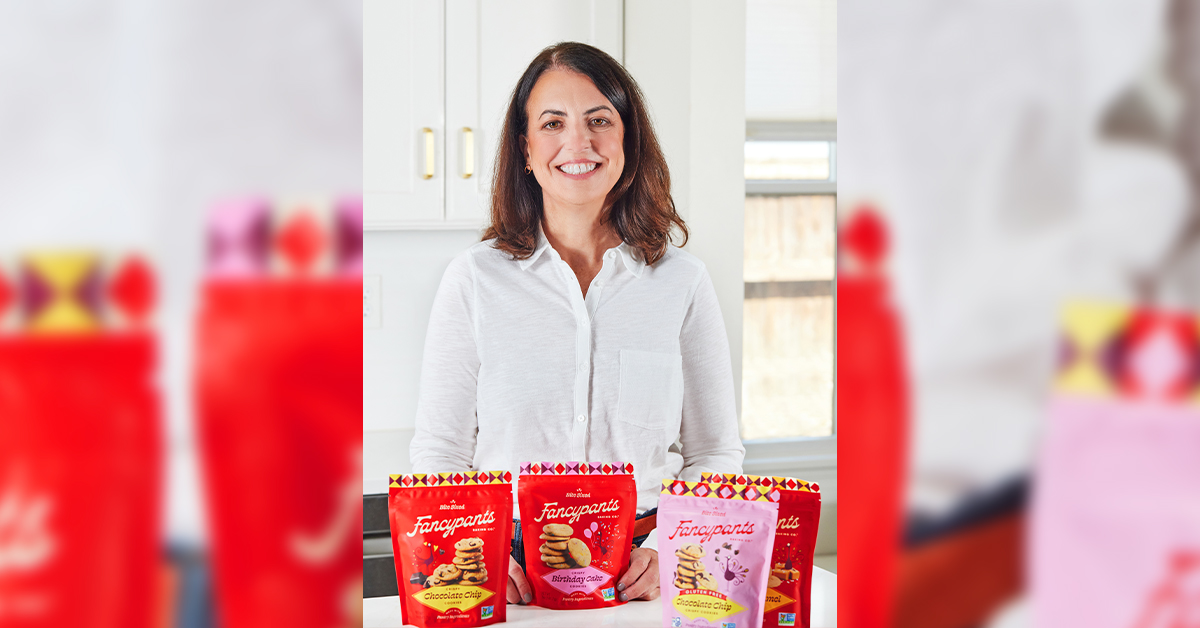
How Has Fancypants Evolved?
Fancypants’ strategic shift to the new bite-sized cookie line aligns with the rising consumer trend of permissible indulgence and, the brand claims, reflects its commitment to creating sustainable and eco-friendly products. The R&D process took approximately 18 months, during which the company nailed down fully recyclable packaging and went through various iterations of each flavor.
Though the new SKUs differ from the old decorated cookies, Duggan says Fancypants remains dedicated to using what she calls “real pantry” ingredients, such as King Arthur flour. In fact, Fancypants claims to be the first packaged cookie product to feature the King Arthur brand logo on its packaging.
In terms of sustainability, Fancypants utilizes oat flour that is dried and milled from the oat pulp left over from the oatmilk making process. The company combines this oat flour (produced by its Upcycled Certified partner) with King Arthur flour to create the base of its cookies.
Fancypants claims it will save 25 million gallons of water and divert enough greenhouse gas emissions to charge 2.7 million cell phones this year just by baking with upcycled oat flour.
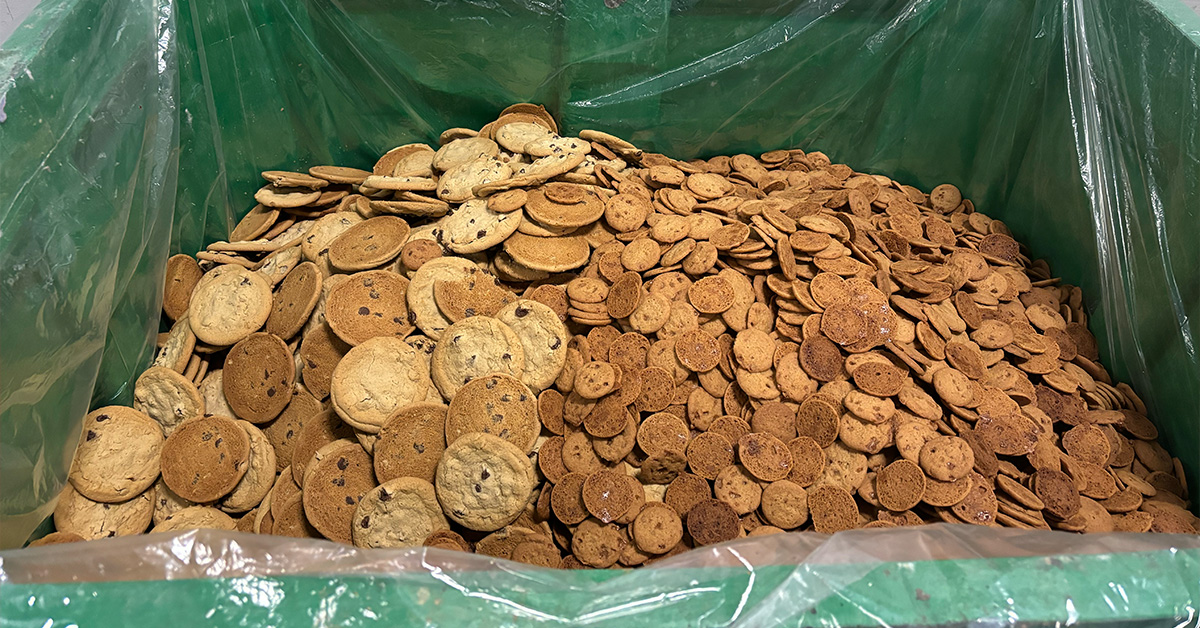
Additionally, the bakery partners with Weston, Mass.-based Vanguard Renewables to dispose of its inedible cookie waste (burnt, fallen on the floor, etc.), which is collected in a bin on the factory floor. Vanguard picks up the bin every one to two weeks, depending on the volume, and hauls it 60 miles away to a farm in Western Massachusetts. There, the waste is placed into an anaerobic digester and converted into biogas that powers the farm and nearby homes.
“The premium ingredients, coupled with the sustainability pieces, make us stand out in the cookie category. And we have a couple of other things too, like the fact that we are Farm Powered and Women-Owned,” said Duggan.
According to a recent report by Mintel, the U.S. cookie market size grew 4.6% in 2024, reaching $15.5 billion in sales, primarily driven by moderate price increases on top of relatively flat volume growth. Frequent cookie consumption is becoming more commonplace, per the report, with over one in 10 Americans consuming them multiple times daily. Other competitors in the crowded category include Tate’s Bake Shop, Maxine’s Bakeshop and Pepperidge Farms, among others.
Fancypants also believes one of its key differentiators is its allergen-friendly status; the brand’s facility is nut-free, sesame-free and shellfish-free. And in June, the company announced the launch of its first gluten-free SKU, Gluten Free Chocolate Chip Cookies. The Non-GMO and Upcycled Certified treats are baked with Belgian-style dark chocolate chips, U.S.-grown rice flour and upcycled okara flour.
The decision to shift away from decorated cookies appears to be a fruitful one; this year, Fanypants is set to bring in over $1 million in revenue. The business is and always has been profitable, according to Duggan.
What’s Next?
Looking ahead, Fancypants plans to execute “some sort of raise” in the next three to six months that Duggan says will either be a debt or equity raise. The funding will be used to expand the brand’s in-house sales team and support marketing efforts.
The brand will also focus on strategically expanding its brick-and-mortar distribution footprint. According to Duggan, Fancypants is “certainly targeting” the natural channel, but ultimately, the brand wants to be a mass market product.
“We’re absolutely dedicated to making sure we keep up our velocities over the long term because we believe that’s a winning strategy. You won’t see us land in 20,000 stores, even though we could handle that,” said Duggan.
She continued, “In the next year, we’ll be very thoughtful [about retail distribution] and supporting everywhere that we are. If there’s an area where we have a stronghold, then we might focus a little more on that as we open up DCs.”



